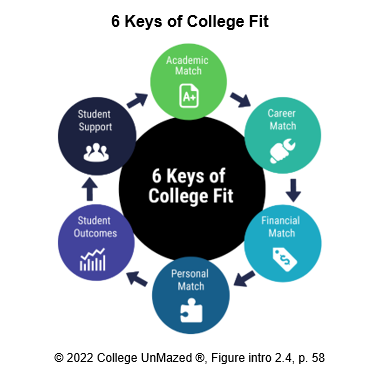Flip the College Decision Making Odds in Students’ Favor
By Dr. Richard Lapan
We, at College UnMazed, welcome you back to the start of the new school year! We believe the work you do is critical to the college and career success of your students. As you know so well, helping students and their families make truly informed decisions about which college to attend is key. Assisting students to discover and use the right kind of information improves their chances of finding exactly what they want and need at the college they will enroll in next September, 2024.
Students can make more informed decisions about which college to attend when they understand each college they are considering from 6 key perspectives. We call these the 6 Keys of College Fit.
Academic Match: Understanding how a student’s academic profile compares to students attending a college they are interested in and how well that college’s learning environment fits them. What are the student’s chances of getting admitted? What are the class sizes? Are the courses writing intensive?
Personal Match: Does the college match the student’s personal preferences to help them design the lifestyle they want? Characteristics of the college, like distance from home, size of the school, diversity of the student body, and specialty mission of the college, should be considered.
Financial Match: Knowing what each college will cost, developing a family plan to manage the cost of paying for college, learning about FAFSA, scholarships, grants, loans, and how to keep your funding once you are in college should be on everyone’s radar.
Student Outcomes: How well does each college retain and graduate students? What are the average salaries of graduates once they are out in the world of work? How well do graduates do when applying to graduate study in programs like medicine, law, dentistry, optometry, and psychology – just to mention a few?
Student Support: What are the student support services available at each college a student is considering? How good is the academic support center in providing tutoring and writing assistance? What are the disability, advising, and counseling support services available on campus? Student support services play a critical role in helping students successfully integrate into the academic and social life of every college.
Career Match: Making sure that available college majors align with career aspirations should be an important topic for conversation. Are their mentoring opportunities and internship programs available in different career pathways? Does the college’s alumni network play an active role in supporting graduates' career success? What is the college’s career service office like?
Students and their families can flip the college decision-making odds in their favor by using all 6 Keys of College Fit. When students and their families understand a college from each of the 6 key perspectives, they have better information to decide which school fits them best. Unfortunately, students only use a couple of these keys when deciding on which colleges to apply to. Each of the 6 Keys offers vitally different information. When all 6 Keys aren’t used, critical information is lost. It is not made available for the student and their family to consider.
We have responded to this need by developing the My College Fit Priorities Card Sort (www.collegeunmazed.com/mycfp). Our card sort can be used individually, in classroom groups, and with families to help participants identify which of the 6 Keys of College Fit are important to them. Students seriously think through what priorities are most important to them and discuss their preferences. The card sort helps students to learn how to assess each college they are considering from all 6 keys. In this way, students learn how to flip the college decision making odds in their favor.
To help you with this part of your college counseling work, we will, on the first Monday of every month, send out a blog that explores in some depth each of the 6 Keys of College Fit and how they are operating this year at different colleges around the United States. We hope these provide you useful information in your work with students and families. As always, we welcome your feedback and suggestions. Thank you for the work you do supporting students and their families.


